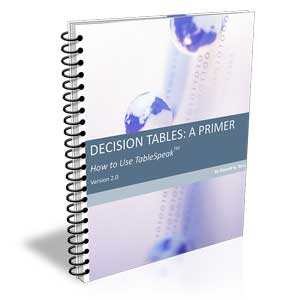Essence Definitions and Business Rules ~ Developing Stable Anchor Points for Operational Knowledge
The central idea of the business rules approach is that any aspect of business guidance or know-how that might change should be treated as rules. In forming definitions, therefore, the practitioner should always focus what is unlikely to ever change -- that is, on the fundamental essence of business concepts. We call such statements essence definitions .
For example, consider the definition of 'customer' proposed by a practitioner in a real-life project.
Customer: An organization or individual person that has placed at least one paid order during the previous two years
Consider the areas of business practice that might change over time:
- That a customer may be either an organization or an individual person.
- That placing orders is the core criterion for being a customer.
- That a minimum of exactly one order is a criterion for being a customer.
- That an order having been paid is a criterion for being a customer.
- That the timeframe of exactly two years is a criterion for being a customer.
Now consider the Webster's definition (2a) of 'customer'.
Customer: one that purchases some commodity or service; especially: one that purchases systematically or frequently
The Webster's version is clearly better. The embedded business practices of the practitioner's version should be treated as forms of guidance, as follows.
Rule: A customer always places at least one paid order during the previous two years.
Clarification: A customer may be an organization or individual person.
Is the Webster's definition exclusively 'essence'? Almost, but not quite. Note the word 'purchases' in the 2a definition. Having to purchase something to be a customer is a constraint. Many people (especially marketing!) would probably not want to place that constraint on being a 'customer'.
We might therefore want to go the Webster's definition one better by relaxing the embedded 'purchases' constraint, as follows. (This modification builds on the sense of Webster's definition 4, so actually we are not going very far afield. Straying from Webster's is always the last-ditch option.)
Customer: one that purchases or that might purchase some commodity or service
This is about as close to pure essence as a definition for this concept could possibly become -- a very stable anchor point for encoding operational business knowledge.
# # #
About our Contributor:
Online Interactive Training Series
In response to a great many requests, Business Rule Solutions now offers at-a-distance learning options. No travel, no backlogs, no hassles. Same great instructors, but with schedules, content and pricing designed to meet the special needs of busy professionals.










How to Define Business Terms in Plain English: A Primer
How to Use DecisionSpeak™ and Question Charts (Q-Charts™)
Decision Tables - A Primer: How to Use TableSpeak™
Tabulation of Lists in RuleSpeak®: A Primer - Using "The Following" Clause
Business Agility Manifesto
Business Rules Manifesto
Business Motivation Model
Decision Vocabulary
[Download]
[Download]
Semantics of Business Vocabulary and Business Rules